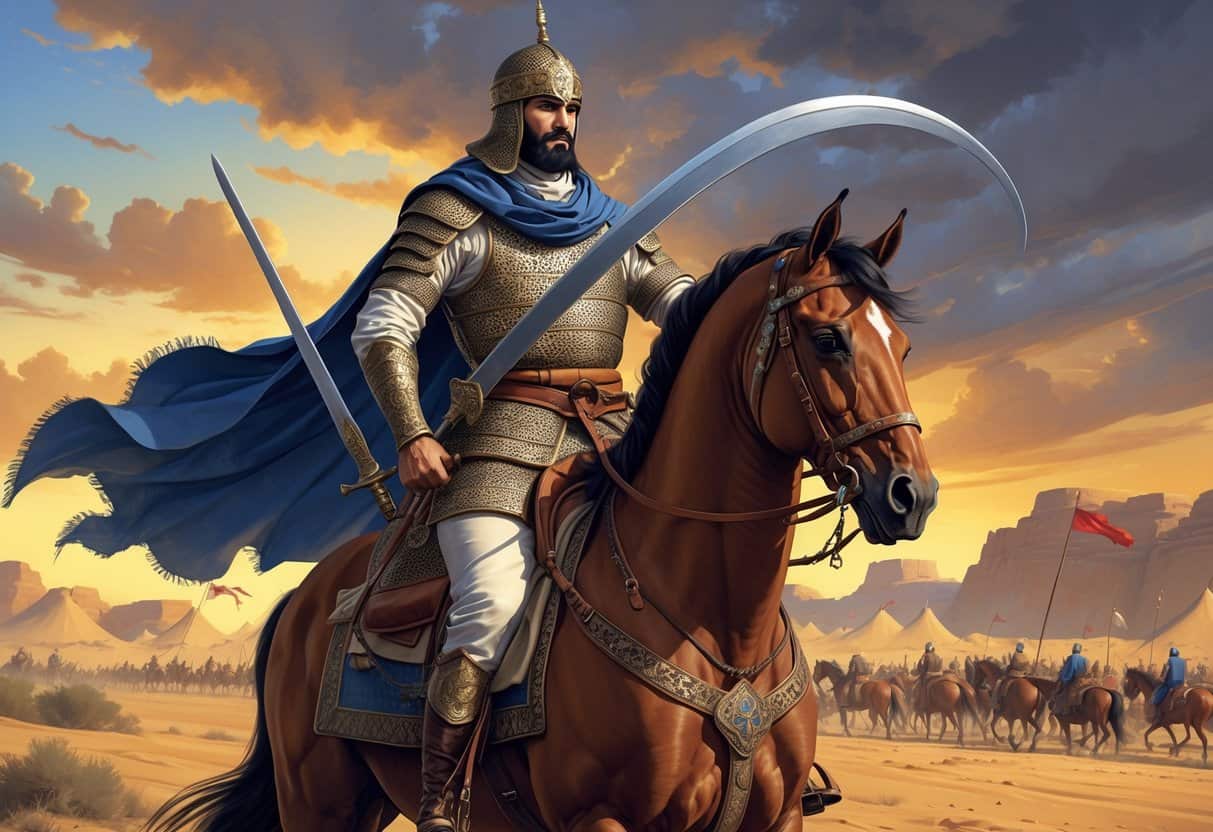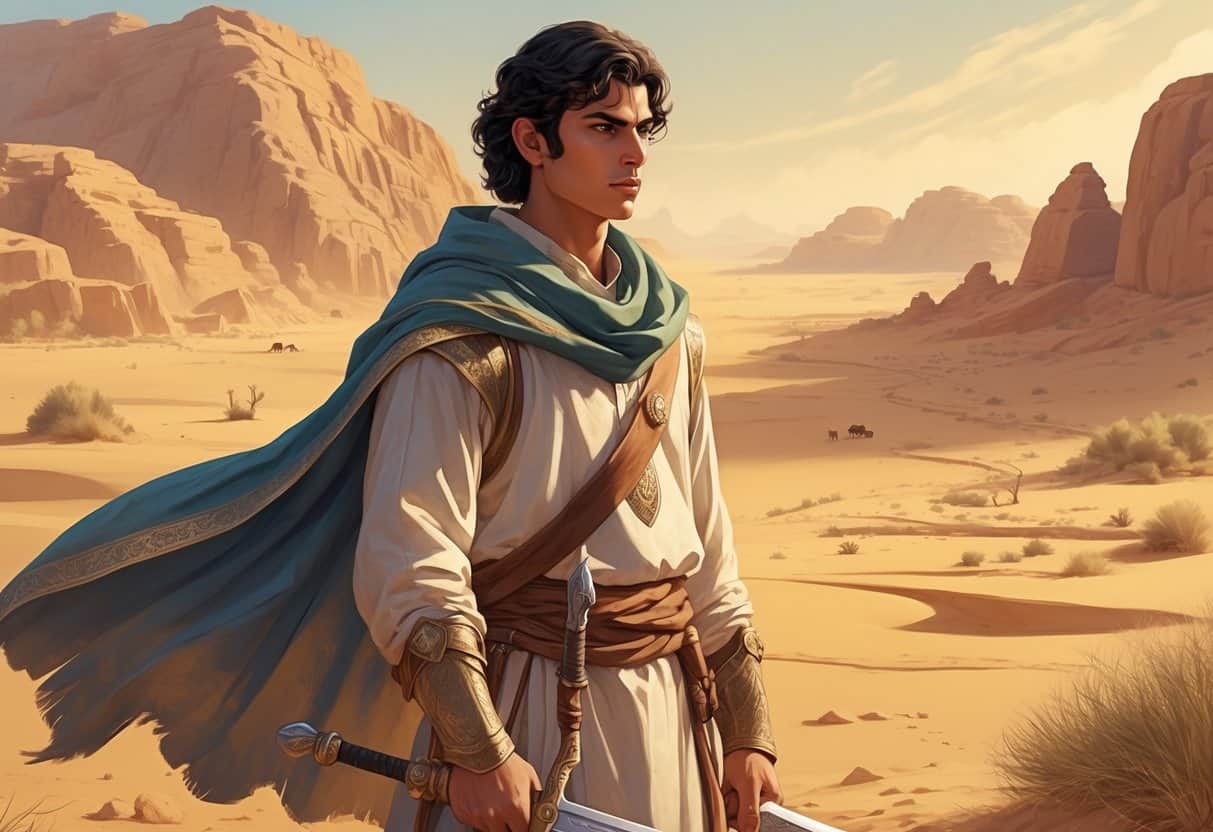Khalid ibn al-Walid stands out as one of history’s most impressive military commanders, never experiencing defeat in battle. He used sharp tactics and unwavering leadership to overcome larger armies, even against the mighty Byzantines.
His record of victory in every conflict makes him a central figure in early Islamic military history.

Let’s take a look at his life, from his early days and conversion to Islam, to his rapid rise as a respected general. His choices shaped major campaigns and helped spread Muslim influence in the 7th century.
This guide breaks down the key moments of his career and the impact that still lingers.
Key Takeaways
- Khalid ibn al-Walid never lost a battle and routinely outmaneuvered stronger enemies.
- His rise was tied closely to his faith and the early years of Islam.
- His tactics still shape how we think about leadership and strategy.
Khalid ibn al-Walid’s Early Life and Conversion to Islam

Khalid’s family roots, his acceptance of Islam, and his connection to Prophet Muhammad all played a big role in his story. These early experiences shaped his path in Islamic history.
Background and Family Lineage
He was born into the Quraysh tribe in Mecca, a family with serious status. His father, Al-Walid ibn al-Mughira, was a notable leader, which meant Khalid grew up with influence.
The Arabian Peninsula at the time was a patchwork of tribes and rivalries. Khalid’s clan, Banu Makhzum, was especially known for its warriors.
He learned combat and leadership skills from a young age. This early training set him up for the part he’d play as Islam started to rise.
Embrace of Islam and Early Influences
At first, Khalid opposed Islam as it spread through Mecca. But around 629 AD, after Prophet Muhammad’s migration to Medina, Khalid made the leap and accepted Islam.
That decision was a real turning point. He was influenced by the message of Islam and Muhammad’s leadership.
Once he joined the Muslim community, Khalid quickly became a top military leader. His background and new faith helped the Muslims tackle major challenges.
Relationship with Prophet Muhammad
Khalid’s close bond with Prophet Muhammad was a huge factor in his rise as a commander. Muhammad appointed him to lead Muslim forces after his conversion.
He was given the title “Saifullah,” or “The Sword of Allah,” which speaks volumes about the trust placed in him. That name wasn’t just for show—it marked him as a defender of Islam.
Khalid went on to carry out many missions under Muhammad’s guidance. Their partnership shaped his dedication and approach in critical battles.
Military Leadership and Major Campaigns
Khalid ibn al-Walid showed remarkable leadership and clever tactics in all the big battles he fought. His actions pushed the early Muslim conquests far beyond Arabia—into Iraq, Syria, and more.
Let’s see how his skills led to victories over powerful adversaries like the Byzantines and Persians.
Battle of Uhud and Early Military Engagements
At the Battle of Uhud, Khalid actually fought against the Muslims as part of the Quraysh. This early experience tested his abilities and gave him a taste of high-stakes warfare.
After his conversion, Khalid quickly took on a lead role in the Muslim army. His early campaigns helped stabilize Muslim rule in Arabia.
He often used surprise attacks and strong cavalry maneuvers. These small but sharp victories paved the way for bigger campaigns.
Conquests in Syria and the Levant
Khalid led major campaigns in Syria and the Levant, areas then ruled by the Byzantine Empire. He focused on speed and tight coordination between infantry and cavalry.
Victories at places like Ajnadayn and Yarmouk opened the Middle East to Muslim control. Sometimes he was outnumbered, but his quick thinking and tactics won the day.
Khalid’s leadership was key to the spread of Islam outside Arabia. He secured much of what’s now Syria, Lebanon, Jordan, and Palestine.
Campaigns in Iraq and Persia
Khalid’s role expanded with campaigns against the Persians in Iraq and parts of Iran. Under Caliph Umar’s orders, he led Muslim armies against the Sassanid Empire.
His relentless offensives broke Persian control over major cities like Al-Hirah and Ctesiphon. These wins weakened the Persian Empire and gave Muslims a foothold in Iraq.
Egypt and North African Expeditions
Khalid wasn’t directly in charge of the full conquest of Egypt, but his earlier campaigns influenced the overall strategy. The Muslim push into Egypt and North Africa followed after they’d stabilized the Middle East.
These expeditions targeted Byzantine territories. Khalid’s lessons in tactics and adaptation were put to use as Muslim armies moved into new regions.
Key Points Table
| Region | Opponents | Notable Battles | Military Focus |
|---|---|---|---|
| Arabian Peninsula | Quraysh, local tribes | Early battles including Uhud | Cavalry charges, surprise maneuvers |
| Syria and Levant | Byzantine Empire | Ajnadayn, Yarmouk | Speed, coordination, managing outnumbered forces |
| Iraq and Persia | Sassanid Persian Empire | Al-Hirah, Ctesiphon | Aggressive attacks, breaking enemy control |
| Egypt and North Africa | Byzantine Empire | Later Muslim campaigns | Adaptation to new terrains, follow-up conquests |
Legacy, Principles, and Islamic Historiography
Khalid ibn al-Walid’s legacy comes from his clear-headed leadership, deep faith, and sense of justice. He mixed practical strategy with religious guidance.
His actions also left a mark on Islamic law and the way Muslim armies operated after him.
Leadership Qualities and Principles of War
There’s a lot to learn from Khalid’s approach. He balanced bold moves with careful planning and used speed and surprise to win fast.
He was big on discipline and clear communication. Khalid motivated his troops with a shared goal—defending Islam.
His leadership style was tough but fair, which built loyalty. He tried to minimize harm and avoid pointless suffering, saving resources and boosting morale.
Religious Zeal and Divine Guidance
Khalid’s faith was at the center of his actions. He believed his victories came from God, as taught in the Qur’an.
Prayer and worship were part of his routine before battles. He saw himself as a mujahid, or fighter for a religious cause, which gave him grit even when things looked rough.
His trust in God helped him lead with confidence. That religious drive was a personal strength and a force that united his troops.
Justice, Mercy, and Treatment of Opponents
Khalid had a strong sense of justice. He treated prisoners fairly and didn’t allow torture, sticking to Islamic teachings.
Mercy mattered to him, even with enemies. He protected civilians and respected non-Muslims’ freedom of religion.
This fairness earned him respect. Principles of justice and forgiveness were at the core of his military conduct.
Impact on Islamic Law and Society
Khalid’s actions shaped early Islamic law, especially around wartime rules. His stance against torture and focus on justice set standards for later Muslim armies.
His leadership brought security and fairness to newly conquered areas. This helped build stable societies grounded in Islamic values.
The way he balanced warfare with ethics influenced later leaders. It’s pretty clear that Islamic law grew from both scripture and hands-on experience.
Sources, Historians, and Continuing Influence
Both old and new sources shape how we see Khalid ibn al-Walid today. His influence is still felt in many Muslim countries, especially those he once led or affected.
Classical and Modern Historiographical Accounts
Much of what we know comes from historians like Al-Tabari and Al-Baladhuri. They wrote long after Khalid’s time but relied on earlier records.
They describe his leadership in key battles, like Yarmouk near Damascus, and his campaigns across Arabia and Byzantine lands. His role in battles such as Mu’tah and his tactical innovations get plenty of attention.
Modern scholars have to work with limited—and sometimes biased—information. Islamic historiography tends to focus on Khalid’s faith and loyalty, which can color the story. Still, his reputation as a brilliant, unbeaten commander endures.
Legacy Throughout the Muslim World
Khalid’s legacy runs deep in places like Saudi Arabia and Pakistan. His name pops up on military units, schools, and even street signs—it’s everywhere, honestly.
People respect his undefeated record. It’s almost legendary at this point.
His campaigns against the Byzantines and the collection of jizya from conquered lands are still taught in Islamic history classes.
Damascus, a city that once faced his armies, remembers him as a symbol of Islamic strength. The way he managed to unite tribes and take on the Romans? That’s something military leaders still talk about today.
